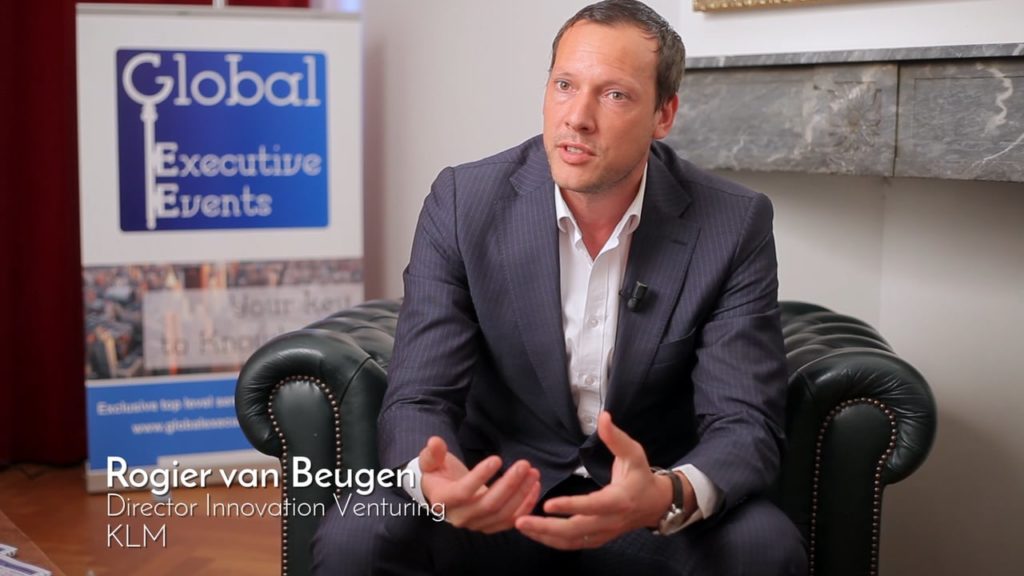(Editor’s note: Dispatches is dedicated to the global mobility of talent. And it doesn’t get any more mobile than KLM and the airline industry.)
In the Bad Old Days, it was nearly impossible for startups to get in front of the people who count … potential investors or foundational clients.
That was then.
 Yeah, the world’s best companies are still naturally selective. We know .. Dispatches is a startup, and top executives at global corporations sometimes (gasp!) don’t take our calls. But in 2017, executives looking to give their company an edge are increasingly reaching out to startups. You could even say, “pursuing.”
Yeah, the world’s best companies are still naturally selective. We know .. Dispatches is a startup, and top executives at global corporations sometimes (gasp!) don’t take our calls. But in 2017, executives looking to give their company an edge are increasingly reaching out to startups. You could even say, “pursuing.”
With an introduction from Fancy van de Vorst, program founder and program manager with Eindhoven-based corporate-startup matching program COSTA, we scored an interview with Rogier van Beugen, director, Innovation Venturing for KLM/Air France in Amsterdam.
KLM is definitely no startup: It’s the oldest airline in the world still operating with its original name. Today, after a 2004 merger with Air France, the combined airlines fly about 400 aircraft to 90 countries and have almost 100,000 employees. Both Air France and KLM are consistently ranked in the T0p 25 airlines based on service, safety, and on-time flights.
Looking to startups to stay competitive
To stay atop one of the world’s toughest, most complex business verticals, KLM is one of the more aggressive airlines when it comes to recruiting startup talent.
KLM runs monthly start up events where the company tries to “cherry pick” the most relevant startups to work with on travel and logistics issues, van Beugen said. (The company has a portal, Journeys of Innovation, that links to KLM challenges.)
In the events, startup teams pitch to a room of 20 or 30 KLM executives who are looking for a wide range of new ideas and new technology in, for example, UX, baggage automation and loyalty programs.
The issue isn’t whether KLM will work with startups, it’s where to get sufficient talent: “There’s so much out there, how are we going to find the right startups?”
Unlike banks and fintech startups, KLM doesn’t bring the successful startups in-house. Rather, startups are seen as long-term suppliers, van Beugen said. KLM, with several Dutch companies, is also a sponsor of the annual Dutch Open Hackathon.)
So, you want to work with KLM?
The airline is looking for teams with ideas and products in multiple industry categories including AI, Facebook Messenger bots, user experience, baggage automation and aircraft maintenance.
“We also invest in stuff for the betterment of aviation and logistics,” van Beugen said, including Green tech, security tech and some inflight technology.
The quality of the startup is more important than the specificity of the pitch, van Beugen said. And there are a lot subjective and objective metrics in deciding who gets to work with KLM.
“Does it fit with our stage? Does it fit with the maturity of the startup we’re looking for?” he said.
It’s not that startups should necessarily be mature or immature, van Beugen said. It’s that the maturity of the startup should fit into what KLM executives like to experiment with, “and that’s extremely subjective.”
Also, the project tends to define the structure of the relationship.
“In aircraft maintenance, it’s purely an (experimental) setup,” van Beugen said. “If everything goes wrong, no harm done. So the maturity of the startup is relatively low. These are smart guys. We have confidence that in time, they’ll develop something great.”
With the FB Messenger bot, “that’s customer facing, so we want a high-maturity company,” van Beugen said. Though still a startup, the FB Messenger bot company is more more mature, but is more intensly guided through the pilot, he said.
Scouring the world for innovators
KLM is based outside Amsterdam near Schiphol Airport. The airline is one of a dozen Dutch companies participating in COSTA, an Eindhoven-based initiative that brings together corporations and startups. In addition to KLM, participants include KPN, Shell, Philips, AkzoNobel, ING, Thales Nederland, Rabobank, and Unilever.
But KLM’s outreach to startups is global, with connections to a network of 25 incubators/accelerators from Europe to Asia to the United States.
KLM is also a limited partner in a modest venture fund, “so we do corporate venturing,” van Beugen said.
Asked where the talent is, the innovation officer didn’t hesitate: Israel.
“What we see in Tel Aviv – and Israel in general – is there’s excellent technology development in terms of not just building a simple app or web solution and trying to build from there,” van Beugen said. Israel has a lot of entrepreneurs who build a very sophisticated product before going to market:
When you talk to an Israeli entrepreneur, they say, “Well, I have built a solution for voice recognition.” You can bet there’s been a team of people working on it for over a year before he puts it out there. They invest more in developing unique technology where I would say (startups) in Europe are more interested in building an MVP and seeing if it ticks. They have a different approach And that can be very refreshing.
Israel also has more development capacity, relatively speaking, than Europe, with their tech sector ecosystem producing more coders and developers.
“They have excellent coding talent and lots of it,” van Beugen said. “They’re not cheap. And maybe what’s not considered cheap now is a good investment for the future.”
Van Beugen visits Tel Aviv once a year, and he finds himself returning and advocating to the Dutch that they start pushing coding: “We should bring more people up to speed on coding because otherwise, we’re losing.”
The acceleration of high-tech is soaking up talent while pushing up wages. Van Beugen noted that the average coder salary in Silicon Valley is approaching $100,000.
That’s now spreading to Europe.
KLM has positions open, “and we have no lack of applications. We’re doing good stuff, but we can certainly do it faster and better,” Van Beugen said.
“If you’re good in Python, and have big data in your CV, there’s a good chance you’ll get an offer at a nice pay grade.”
How to get the process started:
KLM is open to talking to all start-ups. This often starts with an email, a call, and a ‘pitch deck’, after which a decision is made. To get in touch, email KLM at [email protected].
If you’re looking for an investment, go to the Mainport Innovation Fund website here.
Here are the dates for the next 2017 pitch events: 10 July, 4 September, 2 October, 30 October and 27 November.
Here’s are some of the categories of interest to KLM execs:
- Leveraging (Big) Data – how to personalize and optimize
- Seamless travel – how do you make travel more seamless?
- Ancillary Revenues – how to make the pie bigger
- Brand Loyalty – how to make our customers love us more
- Operational Efficiency – help us work smarter
- Enhancing communication with our ‘flying’ colleagues
- HR: Talent management, teaming, rostering
- Disruptive Ideas that change our industry
Bonus content:
Here’s a great post on TNooz covering the good and the bad of startups working with airlines.
Co-CEO of Dispatches Europe. A former military reporter, I'm a serial expat who has lived in France, Turkey, Germany and the Netherlands.















